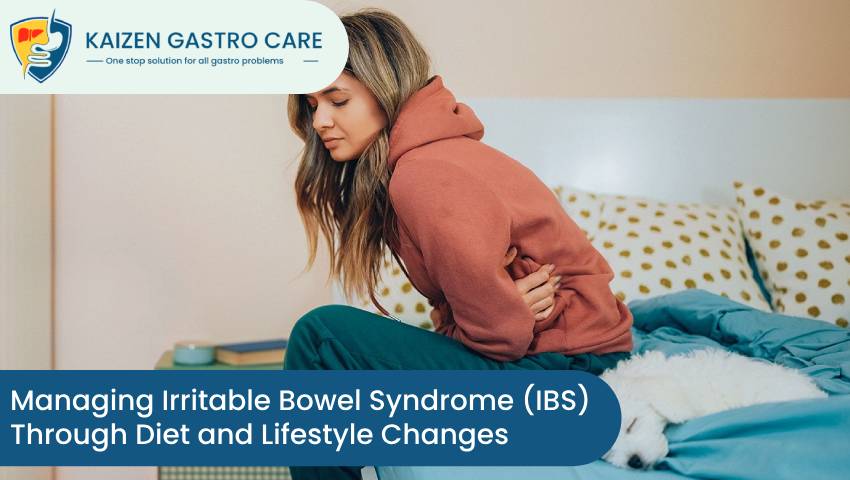
- 15/06/2024
- Kaizen Gastro Care
- 0 Comments
- Gut Health
Managing Irritable Bowel Syndrome (IBS) Through Diet and Lifestyle Changes
Irritable Bowel Syndrome (IBS) is a chronic gastrointestinal condition that affects the large intestine. Characterized by symptoms like abdominal pain, bloating, gas, and altered bowel habits, IBS can particularly impact quality of life. While there is no cure for IBS, effective management through diet and lifestyle modifications can help relieve symptoms and improve overall well-being. As Dr. Vikrant Kale, a leading gastroenterologist at Kaizen Gastro Care Clinic emphasizes, understanding and implementing these changes is important for those suffering from IBS.
Dr. Vikrant Kale is a renowned gastroenterologist & IBS Specialist in Pune with 17+ years of experience in managing gastrointestinal conditions, including Irritable Bowel Syndrome. He is dedicated to providing personalized care and empowering patients with the knowledge and tools to manage their condition effectively. Through his practice, Dr. Kale emphasizes the significance of diet and lifestyle changes in achieving optimal gastrointestinal health.
Understanding IBS:
IBS is a functional disorder, meaning that it affects how the gut works but does not cause any visual damage to the gastrointestinal tract. The exact cause of IBS is unknown, but it is believed to result from a combination of factors including gut-brain interactions, limited gut motility, and heightened sensitivity to pain. Stress and dietary factors often worsen the symptoms.
Dietary Changes for IBS Management:
- Follow a Low FODMAP Diet: The Low FODMAP diet is one of the most useful dietary interventions for IBS. FODMAPs are short-chain carbohydrates that are poorly absorbed in the small intestine, leading to gas, bloating, and diarrhea. The Low FODMAP diet involves three phases:
- Elimination: Avoid all high FODMAP foods for 4-6 weeks.
- Reintroduction: Gradually reintroduce high FODMAP foods one at a time to identify which ones trigger symptoms.
- Personalization: Develop a long-term eating plan that contains only the FODMAPs that are well-tolerated. Common high-FODMAP foods include onions, garlic, wheat, dairy products, certain fruits like apples and pears, and certain vegetables like broccoli and cauliflower.
- Increase Fiber Intake: Fiber can be helpful for IBS, particularly for those with constipation-predominant IBS (IBS-C). Soluble fiber, found in foods like oats, apples, and carrots, is generally well-tolerated and can help regulate bowel movements. However, it is important to introduce fiber slowly to avoid aggravating symptoms.
- Stay Hydrated: Adequate hydration is crucial for digestive health. Drinking plenty of water helps keep stools soft and prevents constipation. It’s generally advised to drink at least 8 glasses of water a day.
- Avoid Trigger Foods: Certain foods and drinks are known to trigger IBS symptoms in many individuals. These include caffeinated beverages, alcohol, spicy foods, and fatty foods. Keeping a food diary can help identify specific triggers and guide dietary adjustments.
- Regular Meals: Eating regular meals at consistent times can help regulate bowel function. Skipping meals or eating large, infrequent meals can disrupt the digestive system and trigger IBS symptoms.
Lifestyle Changes for IBS Management:
In addition to dietary modifications, certain lifestyle modifications can also play a significant role in managing IBS symptoms.
- Stress Management: Stress is a major trigger for IBS signs. Practicing stress-reducing methods such as mindfulness meditation, yoga, deep breathing exercises, and regular physical activity can help manage stress levels. Cognitive-behavioral therapy (CBT) has also been shown to be useful in reducing IBS symptoms by changing negative thought patterns and behaviors.
- Regular Physical Activity: Engaging in regular physical activity can enhance overall gastrointestinal function and reduce symptoms of IBS. Movements like walking, jogging, swimming, and cycling are beneficial. Strive for at least 30 minutes of moderate exercise most days of the week.
- Adequate Sleep: Poor sleep can worsen IBS symptoms. Establishing a regular sleep routine, creating a comfortable sleep environment, and avoiding caffeine and electronic devices before bedtime can help improve sleep quality.
- Probiotics: Probiotics are healthful bacteria that can help support a healthy gut microbiota. They are available in supplements and fermented foods like yogurt, kefir, and sauerkraut. Probiotics may help relieve bloating, gas, and abdominal pain in some IBS patients.
Practical Tips for Implementing Changes:
Implementing dietary and lifestyle modifications can be challenging, but these practical tips can help:
- Start Slowly: Slowly introduce changes to avoid feeling overwhelmed. For example, begin with the low FODMAP diet’s elimination phase or slowly boost your fiber intake.
- Seek Professional Guidance: Working with a dietitian or IBS specialist can provide personalized advice and support. They can help you create a balanced diet plan and monitor your progress.
- Stay Organized: Keep a food and symptom diary to track what you eat and how it impacts your IBS. This can help determine patterns and triggers.
- Be Patient: Managing IBS is a gradual process. It may take time to see improvements, so be patient and continue with your changes.
Conclusion:
Managing IBS through diet and lifestyle modifications needs a comprehensive approach tailored to individual needs. By adopting a low FODMAP diet, adjusting fiber intake, including probiotics, and avoiding trigger foods, many people can find relief from their symptoms. Additionally, stress management, regular exercise, adequate sleep, hydration, and mindful eating play vital roles in managing IBS effectively. With patience, persistence, and professional guidance, it is possible to improve the quality of life for those living with IBS.
